北师大版(2019)必修第二册Unit 5 Humans and nature Lesson 1 A sea story Period 2课件(共34张PPT)
文档属性
| 名称 | 北师大版(2019)必修第二册Unit 5 Humans and nature Lesson 1 A sea story Period 2课件(共34张PPT) | 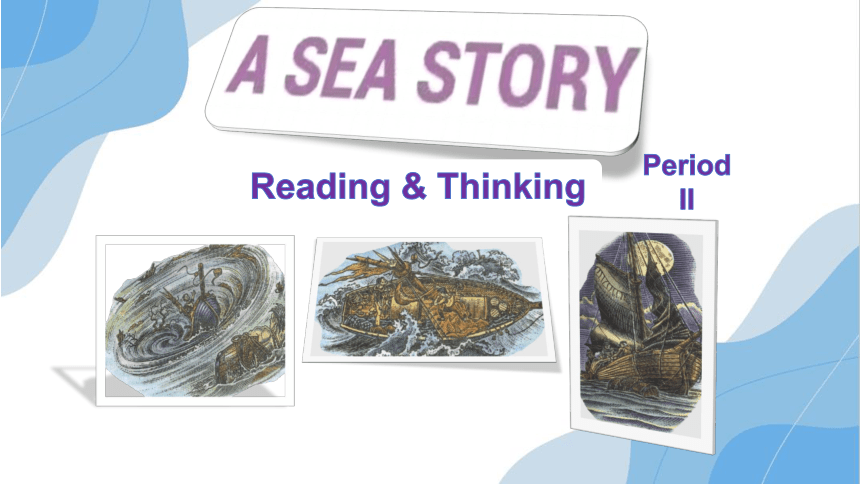 | |
| 格式 | pptx | ||
| 文件大小 | 6.9MB | ||
| 资源类型 | 教案 | ||
| 版本资源 | 北师大版(2019) | ||
| 科目 | 英语 | ||
| 更新时间 | 2024-09-11 12:27:06 | ||
图片预览

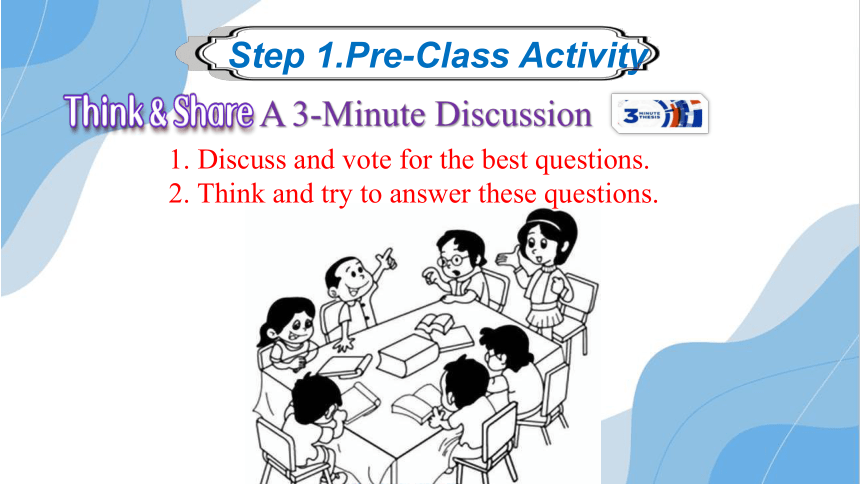
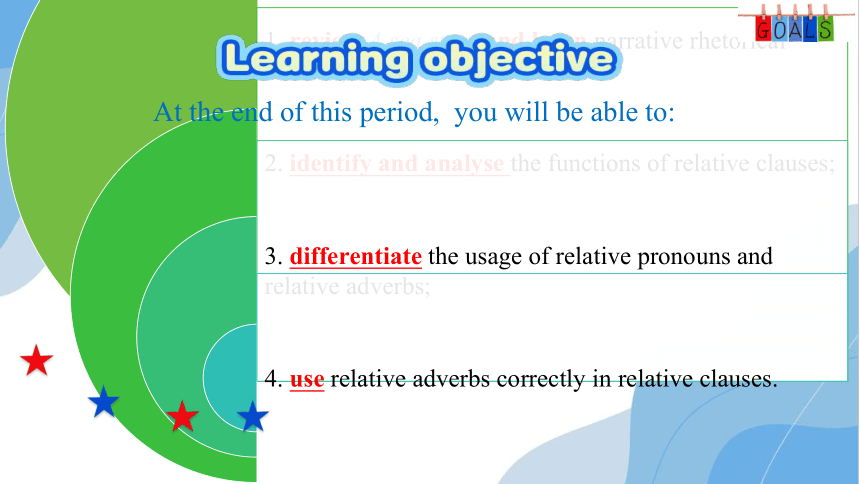
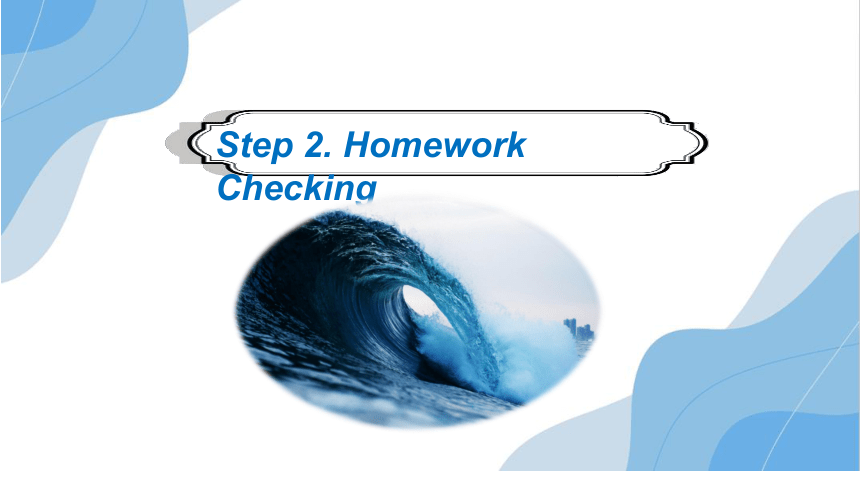
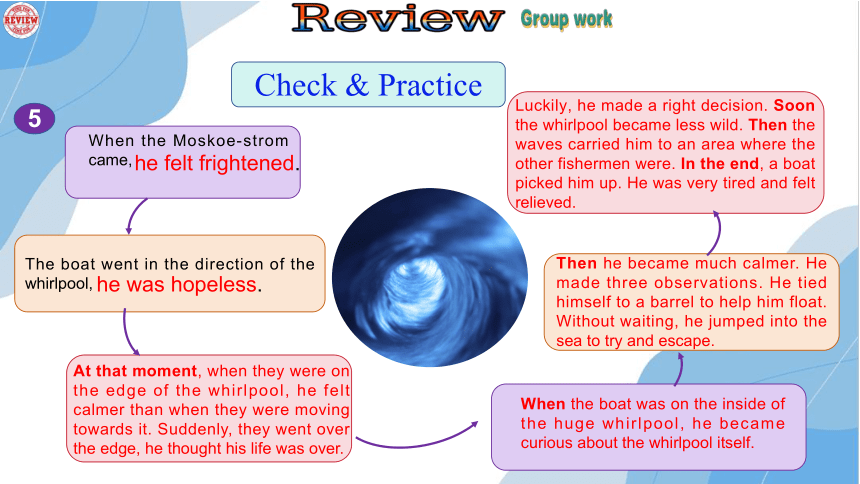
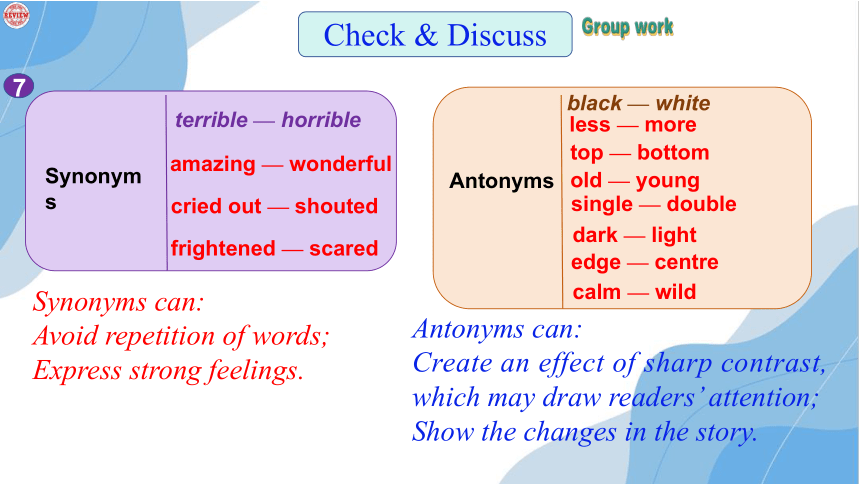
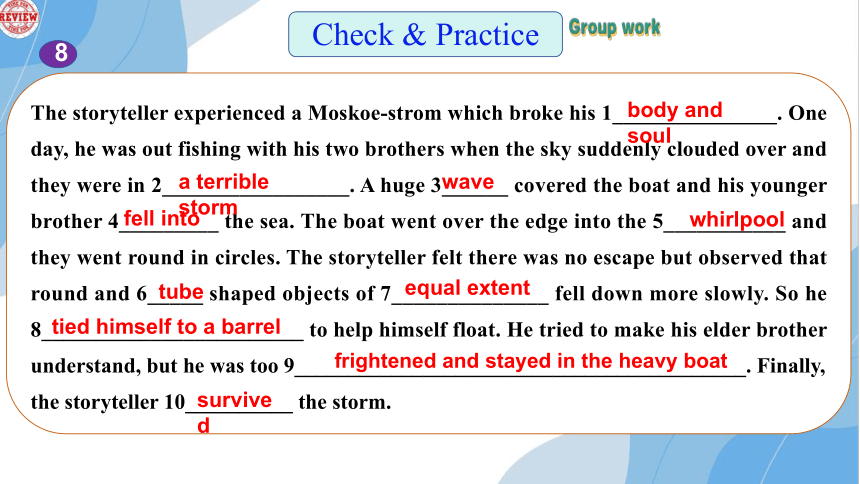
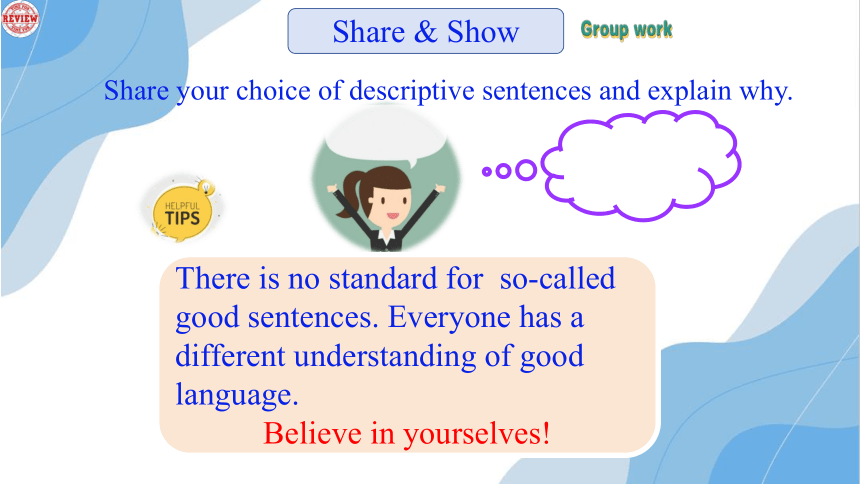
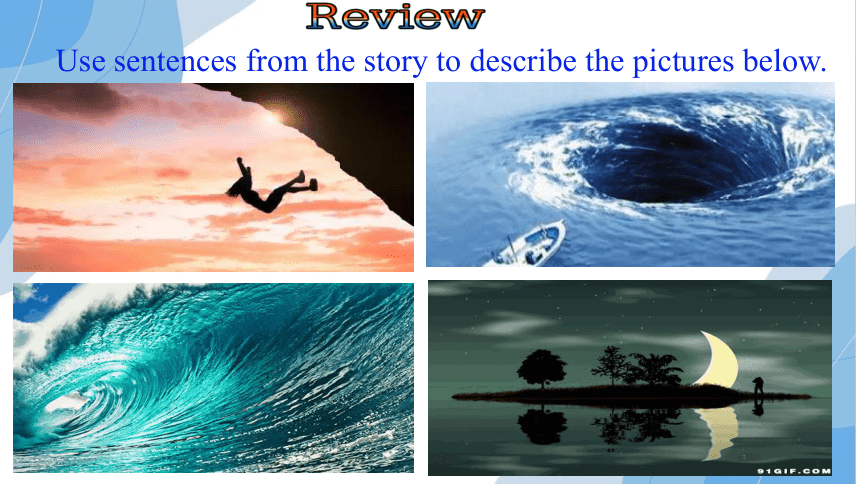
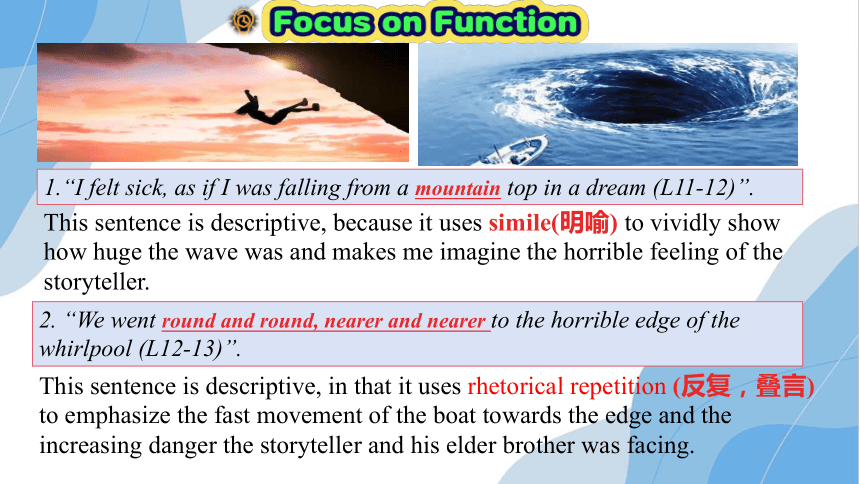
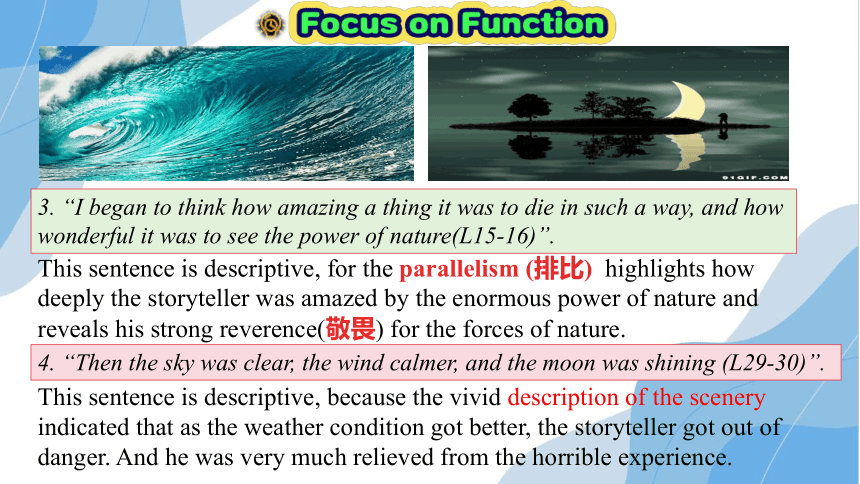
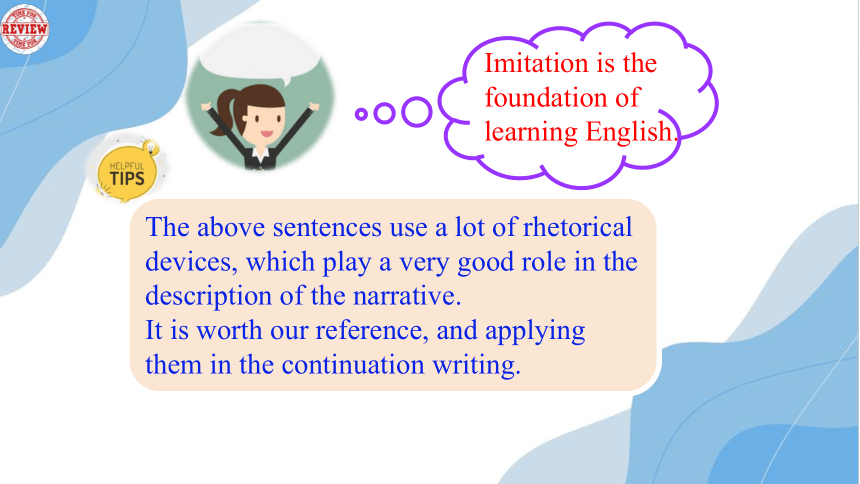
文档简介
(共34张PPT)
Reading & Thinking
Period II
Step 1.Pre-Class Activity
A 3-Minute Discussion
1. Discuss and vote for the best questions.
2. Think and try to answer these questions.
At the end of this period, you will be able to:
Step 2. Homework Checking
Check & Practice
The boat went in the direction of the whirlpool,
When the Moskoe-strom came,
At that moment, when they were on the edge of the whirlpool, he felt calmer than when they were moving towards it. Suddenly, they went over the edge, he thought his life was over.
When the boat was on the inside of the huge whirlpool, he became curious about the whirlpool itself.
Then he became much calmer. He made three observations. He tied himself to a barrel to help him float. Without waiting, he jumped into the sea to try and escape.
Luckily, he made a right decision. Soon the whirlpool became less wild. Then the waves carried him to an area where the other fishermen were. In the end, a boat picked him up. He was very tired and felt relieved.
he felt frightened.
he was hopeless.
5
Synonyms
Antonyms
terrible — horrible
black — white
amazing — wonderful
cried out — shouted
frightened — scared
less — more
top — bottom
old — young
single — double
dark — light
edge — centre
calm — wild
7
Antonyms can:
Create an effect of sharp contrast, which may draw readers’ attention;
Show the changes in the story.
Synonyms can:
Avoid repetition of words;
Express strong feelings.
Check & Discuss
The storyteller experienced a Moskoe-strom which broke his 1_______________. One day, he was out fishing with his two brothers when the sky suddenly clouded over and they were in 2_________________. A huge 3______ covered the boat and his younger brother 4_________ the sea. The boat went over the edge into the 5___________ and they went round in circles. The storyteller felt there was no escape but observed that round and 6_____ shaped objects of 7______________ fell down more slowly. So he 8________________________ to help himself float. He tried to make his elder brother understand, but he was too 9__________________________________________. Finally, the storyteller 10__________ the storm.
body and soul
a terrible storm
wave
fell into
whirlpool
tube
equal extent
tied himself to a barrel
frightened and stayed in the heavy boat
survived
8
Check & Practice
Share your choice of descriptive sentences and explain why.
There is no standard for so-called good sentences. Everyone has a different understanding of good language.
Believe in yourselves!
Share & Show
Use sentences from the story to describe the pictures below.
1.“I felt sick, as if I was falling from a mountain top in a dream (L11-12)”.
This sentence is descriptive, because it uses simile(明喻) to vividly show how huge the wave was and makes me imagine the horrible feeling of the storyteller.
2. “We went round and round, nearer and nearer to the horrible edge of the whirlpool (L12-13)”.
This sentence is descriptive, in that it uses rhetorical repetition (反复,叠言) to emphasize the fast movement of the boat towards the edge and the increasing danger the storyteller and his elder brother was facing.
3. “I began to think how amazing a thing it was to die in such a way, and how wonderful it was to see the power of nature(L15-16)”.
This sentence is descriptive, for the parallelism (排比) highlights how deeply the storyteller was amazed by the enormous power of nature and reveals his strong reverence(敬畏) for the forces of nature.
4. “Then the sky was clear, the wind calmer, and the moon was shining (L29-30)”.
This sentence is descriptive, because the vivid description of the scenery indicated that as the weather condition got better, the storyteller got out of danger. And he was very much relieved from the horrible experience.
The above sentences use a lot of rhetorical devices, which play a very good role in the description of the narrative.
It is worth our reference, and applying them in the continuation writing.
Imitation is the foundation of learning English.
Step 3. Language Focus
-- Relative Clauses(2)
Fill in the blanks with that/which/who/whom/whose.
Review Relative Clauses(1)
Examples from Textbook I P30
When we weren't playing on the court ______________was next to our building, we were watching a game on TV.
Paul didn't know he'd soon get the chance ___________________ he'd been waiting for.
And clearly, all the extra hours ___________________ he'd spent practising alone paid off.
Paul's favourite player was Tyrone Bogues, a guy ______________ played for the Charlotte Hornets, although we actually agree that they are both champions.
⑤ Everyone knew Paul had real skills, and was someone ______________ worked really hard and had a strong desire to play for the team.
⑥ This week, The Lions were playing our main competitors,
The Bears, a team ______________ record this season had been perfect.
that/which
which/that/ /
who/that
whose
which/that/ /
who/that
That was the day when it took only six hours to break my body and soul.
…the waves soon carried me to an area where the other fishermen were.
…the reason why I’m here to tell the story is that I made the right decision.
Focus on language: Relative Clauses(2)
Read the sentences from the text. Underline the words that introduce relative clauses and circle the words that the relative clauses refer to.
9
That was the day when it took only six hours to break my body and soul.
Analyze the sentence
The antecedent
Relative adverb
That was the day.
It only took six hours to break my body and soul on the day.
Adverbial of time
A word for time
Relative clause
Notice:
Relative adverbs when is used to give information about time.
关系副词 when 引导的定语从句提供时间方面的信息。
The reason why I’m here to tell the story is that I made the right decision.
Analyze the sentence
The reason is that I made the right decision.
I’m here to tell the story for the reason.
The antecedent
The word “reason”
Adverbial of reason
Relative adverb
Relative clause
Notice:
In relative clauses, we use why after the word reason.
在reason 后使用 why 引导定语从句。
The waves soon carried me to an area where the other fishermen were.
Analyze the sentence
The waves soon carried me to an area.
The other fishermen were in the area.
The antecedent
A word for place
Adverbial of place
Relative adverb
Relative clause
Notice:
Relative adverbs where is used to give information about place.
关系副词 where 引导的定语从句提供地点方面的信息。
Page 92
Grammar Summary
Summary:
Relative adverbs when and where is used to give information about time and place.
In relative clauses, we use why after the word reason.
Step 4. Language Application
Focus on language: Apply & Practice
Finish Exercise 4 on page 83, check with your partner and practice the conversation out.
where
where
why
why
when
10
Read the sentences below and compare them.
Which choice (a or b) do you think is better Why
1 a Is there a shop nearby I want to buy some sweets in the shop.
b Is there a shop nearby where I can buy some sweets
2 a We can go there on Sunday. Few people go to workon Sunday.
b We can go there on Sunday when few people go to work.
3 a He was so upset for some reason. He didn't tell me the reason.
b He didn't tell me the reason why he was so upset.
√
√
√
Using relative clauses helps to make the sentences logically clearer and more concise. Relative clauses can also help to omit repeated words and expressions.
Summary:
Combine sentences with relative clauses.
Do you remember the village
We worked in the village for five years.
2. No one believed the reason.
Tony was late for school this morning for this reason.
3. Sunday is a day.
Very few people go to work on this day.
4. Canada is a country.
English and French are spoken as official languages
in this country.
Focus on language: Practice makes perfect.
Do you remember the village where we worked for five years
No one believed the reason why Tom was late for school this morning.
Sunday is a day when very few people go to work.
Canada is a country where English and French are spoken as official languages.
① I’ll never forget the day _______________ I lived in the mountains.
② I’ll never forget the day _______________ I spent in the mountains.
when
that/which/ /
1)我永不会忘记我加入中国共产党(the CPC)的那一天。
I’ll never forget the day when I joined the CPC.
Practice & Differentiate
Do translation exercise. Observe and differentiate relative adverbs and relative pronouns.
★Not all words for time use 'when' to introduce a relative clause.
Analyze the sentence and identify the missing part before deciding on relative adverbs or relative pronouns.
① This is the house __________ He was born.
② This is the house __________ was set up by his parents.
where
that/which
2)我出生在鲁迅曾经居住过的一个小镇。
I was born in a small town where Lu Xun once lived.
★Not all words for time use 'where' to introduce a relative clause.
Analyze the sentence and identify the missing part before deciding on relative adverbs or relative pronouns.
★Not all “reason” use 'why' to introduce a relative clause.
Analyze the sentence and identify the missing part before deciding on relative adverbs or relative pronouns.
I will never know the reason why he refused my invitation.
3)我永远也不会知道他拒绝我邀请的原因。
①The reason he was late is that he got up late.
②The reason he told me for his being late is that he got up late.
that/ /
why
Page 92
a. This is the place where we lived ten years ago.
b. The hotel is the one where I stayed last month.
a. I’ve come to the point where I can’t stand him.
b. There are some situations where body language is the only form of communication.
Supplement knowledge about Relative adverb “where”
where引导的定语从句常修饰表示具体地点概念的名词,
如 place,room,house,area,point,situation,case…。
where引导的定语从句还可以修饰表示抽象空间概念的名词
如 case(情况), point(地步) situation(情形), position(位置), stage(阶段)等
where 表示地点,只能跟在表地点或场合的名词后。
相当于 in/at which。
Please leave the book at the place where it was.
=Please leave the book at the place in which it was.
2.when表示时间,只能跟在表时间的名词后。
相当于 on/in/at which。
July, when we can go home for a rest, is coming soon.
=July, in which we can go home for a rest, is coming soon.
3.why表示原因,通常跟在reason后引导定语从句。
相当于 for which。
This is the reason why he cried.
=This is the reason for which he cried.
Relative adverbs : when, where, why 的用法
关系副词引导定语从句时,既引导定语从句,又在定语从句中充当状语。
1. Definition: A clause that acts as an attribute in a compound sentence and modifies a noun or pronoun.
2. Antecedent: A noun, pronoun, or whole sentence that is modified.
3. The words that introduce Relative clauses are:
Relative pronouns :who, whom, whose, which, that.
Relative adverbs :when, where, why.
Summary of
Focus on language:
11
Complete the sentences about yourself using relative clauses.
I’ll never forget the day___________________.
I was born in a city/ town _____________________.
I’ll never know the reason________________.
May 24 was bad day. The school bus did not arrive and we had to walk to school. It was tiresome. Mr Fan, the English teacher, reminded me about the reading poetry competition. I had forgotten it. I had no time to have lunch. I tried to practise at lunch. So I thought I could go to the school library.
Rewrite the following story with relative clauses.
May 24 was a bad day. The school bus did not arrive and we had to walk to school, which was tiresome. At school Mr. Fan, the English teacher; reminded me about the poetry reading competition which I had forgotten. The reason why I had no time to have lunch was I tried to practise at lunch time. So I thought I could go to the school library where I could practise, but it was closed. I came last in the competition during which I felt awkward and had to look down at my book.
One possible version:
Focus on language: Practice & Differentiate
Self- Evaluation for Reading and Thinking Items Criterions Self- Evaluation
Learning & Understanding 1 I can get engaged into checking & reviewing. Yes/No
2 I can analyse and identify the functions of relative adverbs in sentences; Yes/No
Applying & Practicing 1 I can use relative adverbs correctly in relative clauses. Yes/No
2 I can rewrite the story with relative clauses. Yes/No
Transferring & Creating 1 I can differentiate the usage of relative pronouns and relative adverbs. Yes/No
2 I can prepare a story and use relative clauses. Yes/No
Step 5. Self- Evaluation
Compulsory tasks: (IW&PW&GW)
1. Prepare a story about something scary or unusual you experienced or you know and use relative clauses to tell it to your partner.
Homework
Recommended websites:
https://www./articles/205/148/126/15119119714556.html
https://www./goddess-myths/chinese-goddess-mazu.html
Step 6. Post-Class Activities
Reading & Thinking
Period II
Step 1.Pre-Class Activity
A 3-Minute Discussion
1. Discuss and vote for the best questions.
2. Think and try to answer these questions.
At the end of this period, you will be able to:
Step 2. Homework Checking
Check & Practice
The boat went in the direction of the whirlpool,
When the Moskoe-strom came,
At that moment, when they were on the edge of the whirlpool, he felt calmer than when they were moving towards it. Suddenly, they went over the edge, he thought his life was over.
When the boat was on the inside of the huge whirlpool, he became curious about the whirlpool itself.
Then he became much calmer. He made three observations. He tied himself to a barrel to help him float. Without waiting, he jumped into the sea to try and escape.
Luckily, he made a right decision. Soon the whirlpool became less wild. Then the waves carried him to an area where the other fishermen were. In the end, a boat picked him up. He was very tired and felt relieved.
he felt frightened.
he was hopeless.
5
Synonyms
Antonyms
terrible — horrible
black — white
amazing — wonderful
cried out — shouted
frightened — scared
less — more
top — bottom
old — young
single — double
dark — light
edge — centre
calm — wild
7
Antonyms can:
Create an effect of sharp contrast, which may draw readers’ attention;
Show the changes in the story.
Synonyms can:
Avoid repetition of words;
Express strong feelings.
Check & Discuss
The storyteller experienced a Moskoe-strom which broke his 1_______________. One day, he was out fishing with his two brothers when the sky suddenly clouded over and they were in 2_________________. A huge 3______ covered the boat and his younger brother 4_________ the sea. The boat went over the edge into the 5___________ and they went round in circles. The storyteller felt there was no escape but observed that round and 6_____ shaped objects of 7______________ fell down more slowly. So he 8________________________ to help himself float. He tried to make his elder brother understand, but he was too 9__________________________________________. Finally, the storyteller 10__________ the storm.
body and soul
a terrible storm
wave
fell into
whirlpool
tube
equal extent
tied himself to a barrel
frightened and stayed in the heavy boat
survived
8
Check & Practice
Share your choice of descriptive sentences and explain why.
There is no standard for so-called good sentences. Everyone has a different understanding of good language.
Believe in yourselves!
Share & Show
Use sentences from the story to describe the pictures below.
1.“I felt sick, as if I was falling from a mountain top in a dream (L11-12)”.
This sentence is descriptive, because it uses simile(明喻) to vividly show how huge the wave was and makes me imagine the horrible feeling of the storyteller.
2. “We went round and round, nearer and nearer to the horrible edge of the whirlpool (L12-13)”.
This sentence is descriptive, in that it uses rhetorical repetition (反复,叠言) to emphasize the fast movement of the boat towards the edge and the increasing danger the storyteller and his elder brother was facing.
3. “I began to think how amazing a thing it was to die in such a way, and how wonderful it was to see the power of nature(L15-16)”.
This sentence is descriptive, for the parallelism (排比) highlights how deeply the storyteller was amazed by the enormous power of nature and reveals his strong reverence(敬畏) for the forces of nature.
4. “Then the sky was clear, the wind calmer, and the moon was shining (L29-30)”.
This sentence is descriptive, because the vivid description of the scenery indicated that as the weather condition got better, the storyteller got out of danger. And he was very much relieved from the horrible experience.
The above sentences use a lot of rhetorical devices, which play a very good role in the description of the narrative.
It is worth our reference, and applying them in the continuation writing.
Imitation is the foundation of learning English.
Step 3. Language Focus
-- Relative Clauses(2)
Fill in the blanks with that/which/who/whom/whose.
Review Relative Clauses(1)
Examples from Textbook I P30
When we weren't playing on the court ______________was next to our building, we were watching a game on TV.
Paul didn't know he'd soon get the chance ___________________ he'd been waiting for.
And clearly, all the extra hours ___________________ he'd spent practising alone paid off.
Paul's favourite player was Tyrone Bogues, a guy ______________ played for the Charlotte Hornets, although we actually agree that they are both champions.
⑤ Everyone knew Paul had real skills, and was someone ______________ worked really hard and had a strong desire to play for the team.
⑥ This week, The Lions were playing our main competitors,
The Bears, a team ______________ record this season had been perfect.
that/which
which/that/ /
who/that
whose
which/that/ /
who/that
That was the day when it took only six hours to break my body and soul.
…the waves soon carried me to an area where the other fishermen were.
…the reason why I’m here to tell the story is that I made the right decision.
Focus on language: Relative Clauses(2)
Read the sentences from the text. Underline the words that introduce relative clauses and circle the words that the relative clauses refer to.
9
That was the day when it took only six hours to break my body and soul.
Analyze the sentence
The antecedent
Relative adverb
That was the day.
It only took six hours to break my body and soul on the day.
Adverbial of time
A word for time
Relative clause
Notice:
Relative adverbs when is used to give information about time.
关系副词 when 引导的定语从句提供时间方面的信息。
The reason why I’m here to tell the story is that I made the right decision.
Analyze the sentence
The reason is that I made the right decision.
I’m here to tell the story for the reason.
The antecedent
The word “reason”
Adverbial of reason
Relative adverb
Relative clause
Notice:
In relative clauses, we use why after the word reason.
在reason 后使用 why 引导定语从句。
The waves soon carried me to an area where the other fishermen were.
Analyze the sentence
The waves soon carried me to an area.
The other fishermen were in the area.
The antecedent
A word for place
Adverbial of place
Relative adverb
Relative clause
Notice:
Relative adverbs where is used to give information about place.
关系副词 where 引导的定语从句提供地点方面的信息。
Page 92
Grammar Summary
Summary:
Relative adverbs when and where is used to give information about time and place.
In relative clauses, we use why after the word reason.
Step 4. Language Application
Focus on language: Apply & Practice
Finish Exercise 4 on page 83, check with your partner and practice the conversation out.
where
where
why
why
when
10
Read the sentences below and compare them.
Which choice (a or b) do you think is better Why
1 a Is there a shop nearby I want to buy some sweets in the shop.
b Is there a shop nearby where I can buy some sweets
2 a We can go there on Sunday. Few people go to workon Sunday.
b We can go there on Sunday when few people go to work.
3 a He was so upset for some reason. He didn't tell me the reason.
b He didn't tell me the reason why he was so upset.
√
√
√
Using relative clauses helps to make the sentences logically clearer and more concise. Relative clauses can also help to omit repeated words and expressions.
Summary:
Combine sentences with relative clauses.
Do you remember the village
We worked in the village for five years.
2. No one believed the reason.
Tony was late for school this morning for this reason.
3. Sunday is a day.
Very few people go to work on this day.
4. Canada is a country.
English and French are spoken as official languages
in this country.
Focus on language: Practice makes perfect.
Do you remember the village where we worked for five years
No one believed the reason why Tom was late for school this morning.
Sunday is a day when very few people go to work.
Canada is a country where English and French are spoken as official languages.
① I’ll never forget the day _______________ I lived in the mountains.
② I’ll never forget the day _______________ I spent in the mountains.
when
that/which/ /
1)我永不会忘记我加入中国共产党(the CPC)的那一天。
I’ll never forget the day when I joined the CPC.
Practice & Differentiate
Do translation exercise. Observe and differentiate relative adverbs and relative pronouns.
★Not all words for time use 'when' to introduce a relative clause.
Analyze the sentence and identify the missing part before deciding on relative adverbs or relative pronouns.
① This is the house __________ He was born.
② This is the house __________ was set up by his parents.
where
that/which
2)我出生在鲁迅曾经居住过的一个小镇。
I was born in a small town where Lu Xun once lived.
★Not all words for time use 'where' to introduce a relative clause.
Analyze the sentence and identify the missing part before deciding on relative adverbs or relative pronouns.
★Not all “reason” use 'why' to introduce a relative clause.
Analyze the sentence and identify the missing part before deciding on relative adverbs or relative pronouns.
I will never know the reason why he refused my invitation.
3)我永远也不会知道他拒绝我邀请的原因。
①The reason he was late is that he got up late.
②The reason he told me for his being late is that he got up late.
that/ /
why
Page 92
a. This is the place where we lived ten years ago.
b. The hotel is the one where I stayed last month.
a. I’ve come to the point where I can’t stand him.
b. There are some situations where body language is the only form of communication.
Supplement knowledge about Relative adverb “where”
where引导的定语从句常修饰表示具体地点概念的名词,
如 place,room,house,area,point,situation,case…。
where引导的定语从句还可以修饰表示抽象空间概念的名词
如 case(情况), point(地步) situation(情形), position(位置), stage(阶段)等
where 表示地点,只能跟在表地点或场合的名词后。
相当于 in/at which。
Please leave the book at the place where it was.
=Please leave the book at the place in which it was.
2.when表示时间,只能跟在表时间的名词后。
相当于 on/in/at which。
July, when we can go home for a rest, is coming soon.
=July, in which we can go home for a rest, is coming soon.
3.why表示原因,通常跟在reason后引导定语从句。
相当于 for which。
This is the reason why he cried.
=This is the reason for which he cried.
Relative adverbs : when, where, why 的用法
关系副词引导定语从句时,既引导定语从句,又在定语从句中充当状语。
1. Definition: A clause that acts as an attribute in a compound sentence and modifies a noun or pronoun.
2. Antecedent: A noun, pronoun, or whole sentence that is modified.
3. The words that introduce Relative clauses are:
Relative pronouns :who, whom, whose, which, that.
Relative adverbs :when, where, why.
Summary of
Focus on language:
11
Complete the sentences about yourself using relative clauses.
I’ll never forget the day___________________.
I was born in a city/ town _____________________.
I’ll never know the reason________________.
May 24 was bad day. The school bus did not arrive and we had to walk to school. It was tiresome. Mr Fan, the English teacher, reminded me about the reading poetry competition. I had forgotten it. I had no time to have lunch. I tried to practise at lunch. So I thought I could go to the school library.
Rewrite the following story with relative clauses.
May 24 was a bad day. The school bus did not arrive and we had to walk to school, which was tiresome. At school Mr. Fan, the English teacher; reminded me about the poetry reading competition which I had forgotten. The reason why I had no time to have lunch was I tried to practise at lunch time. So I thought I could go to the school library where I could practise, but it was closed. I came last in the competition during which I felt awkward and had to look down at my book.
One possible version:
Focus on language: Practice & Differentiate
Self- Evaluation for Reading and Thinking Items Criterions Self- Evaluation
Learning & Understanding 1 I can get engaged into checking & reviewing. Yes/No
2 I can analyse and identify the functions of relative adverbs in sentences; Yes/No
Applying & Practicing 1 I can use relative adverbs correctly in relative clauses. Yes/No
2 I can rewrite the story with relative clauses. Yes/No
Transferring & Creating 1 I can differentiate the usage of relative pronouns and relative adverbs. Yes/No
2 I can prepare a story and use relative clauses. Yes/No
Step 5. Self- Evaluation
Compulsory tasks: (IW&PW&GW)
1. Prepare a story about something scary or unusual you experienced or you know and use relative clauses to tell it to your partner.
Homework
Recommended websites:
https://www./articles/205/148/126/15119119714556.html
https://www./goddess-myths/chinese-goddess-mazu.html
Step 6. Post-Class Activities
同课章节目录
- Unit 4 Information technology
- Lesson 1 Avatars
- Lesson 2 Apps
- Lesson 3 Internet and Friendships
- Unit 5 Humans and nature
- Lesson 1 A Sea Story
- Lesson 2 Professional Rescue Team
- Lesson 3 Race to the Pole
- Unit 6 The admirable
- Lesson 1 A Medical Pioneer
- Lesson 2 History Makers
- Lesson 3 The Superhero Behind Superman
